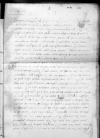Letter #5810
Filippo NICOLA to [Ioannes DANTISCUS]Cremona, 1530-07-15
Manuscript sources:
| ||||||||
Text & apparatus & commentary Plain text Text & commentary Text & apparatus
Salutem plurimam.
Cogitanti mihi, quosnam praecipue boni nostri senis
Producit nos naturae in lucem huius vitae inscios, aufert alterius omnino ignaros, certa tamen spe fultos, quod tam mirabilis fabrica homo funditus interire non debeat. Quod ita verum, remota etiam omni superstitione, semper putavi, ut dicere necesse sit, si aliter sentias et Deum ipsum, et universam ipsam naturam insanire nihilque in rerum natura esse homine miserius, nihil calamitosius. Sed quorsum haec nunc philosophica asseveratio? Nimirum, ut quanto magis possint, desiderium amissi
Nam cum et persancte vixerit, eo magis putandum est esse
Nunc certe maxime  LSB, BR 2, No 2_2 et ipse ad me scribat, habiturum me eum pro hoste, quem pro amicissimo habeo. Quem tamen prius meis scriptis lacessivissem, si ipsum putassem apud vos esse.
LSB, BR 2, No 2_2 et ipse ad me scribat, habiturum me eum pro hoste, quem pro amicissimo habeo. Quem tamen prius meis scriptis lacessivissem, si ipsum putassem apud vos esse.
Novi quidem, quod hinc ad vos scribam, non habeo, nisi forte scire multis vastari multis in locis, quod abhinc multos annos non accidit, a lupis provinciam nostram timerique adhuc annonae caritatem et pestilentiam. Quae mala amoveat Deus.
Dux noster cotidie firmior speroque eum propediem validum fore.
Vale.
Dominationi Vestrae deditissimus

